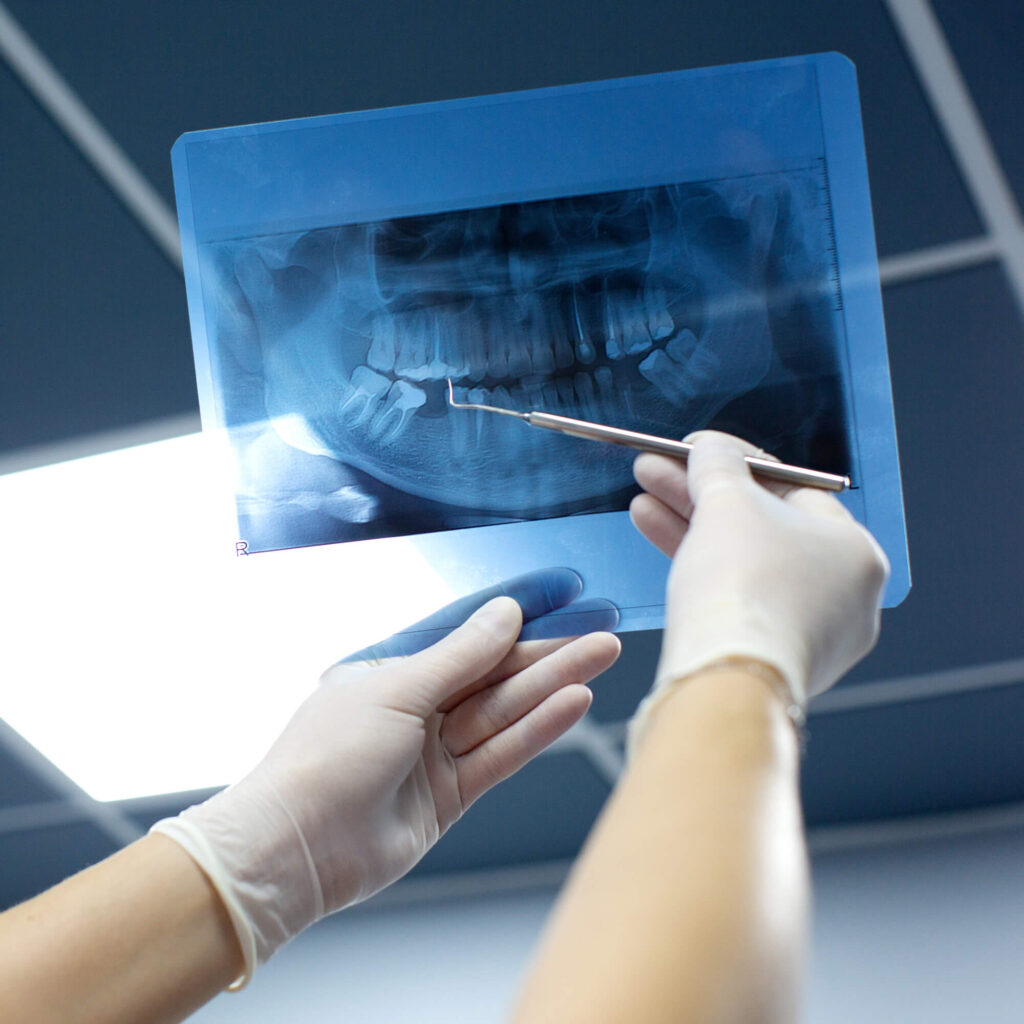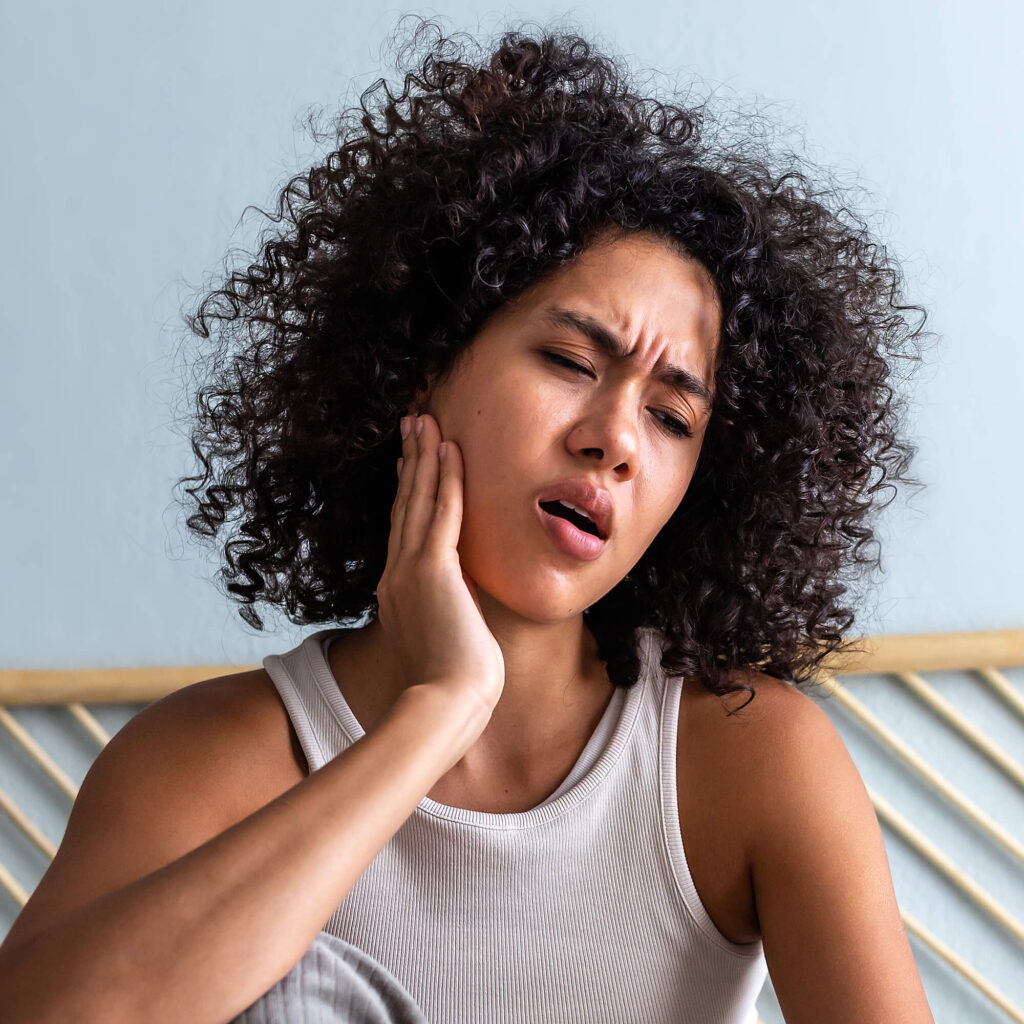
Experience Relief with our Expert Dentist: Painless TMJ Treatment in Dubai
Are you experiencing discomfort and pain in your jaw? Temporomandibular Joint (TMJ) is the joint where your jaws meet, and any disorder affecting it is known as TMD (Temporomandibular Joint Disorder). TMD is characterized by facial tension or pain, earaches, headaches or migraines, neck and shoulder pain, jaw clicking, and difficulty opening your jaws wide.
At Trio Dental Center, we offer comprehensive TMJ treatment that addresses these symptoms. Our expert team focuses on bone, muscle, nerve, and blood vessel aspects of the TMJ, providing relief from TMD

Discover the Root Causes of TMJ Disorder
Temporomandibular Joint Disorder (TMD) can be triggered by various factors. Identifying the underlying causes is crucial for effective treatment.
Bruxism: Teeth grinding or clenching exerts pressure on the TMJ, leading to muscle tension, headaches, and facial pain.
Malocclusion: A bad bite can place frequent pressure on the TMJ, resulting in muscle tension, headaches, and facial pain.
Habits: Frequent gum chewing, thumb sucking, and teeth grinding contribute to the development of TMD.
Traumatic Injuries: Jaw injuries, such as impact or accidents, can disrupt the TMJ and cause TMD.
Stress: Stress is a leading cause of TMD, as it often leads to jaw clenching and muscle tension in the TMJ area.


Recognize the Signs: Common Symptoms of TMJ Disorders
Identifying TMJ disorder symptoms is crucial for timely treatment. Look out for:
- Jaw Movement Issues: Difficulty opening or closing the mouth.
- Jaw and Cheekbone Pain: Persistent discomfort in these areas.
- Eating Discomfort: Pain while eating.
- Earaches or Ringing: Ear-related problems like aches or ringing.
- Headaches: Frequent headaches, especially in the temple area.
- Clicking Sounds: Audible clicks or pops when moving the jaw.
- Dental Changes: Altered bite or tooth alignment.
- Neck and Shoulder Discomfort: Pain in these regions.
- Restricted Jaw Movement: Difficulty moving the jaw side to side or forward.
- TMJ Area Pain: Tenderness when touching the TMJ or jaw muscles.
Seek professional help if you experience these symptoms. Contact us for comprehensive evaluation and effective TMJ disorder treatment.
Treatment Options for TMJ Disorders
Effective treatment options are available to alleviate your pain and discomfort.
Orthodontics: Our skilled orthodontists can correct bad bites, allowing the upper and lower jaws to harmoniously meet, relieving TMJ strain.
Mouth Guards: Customized mouth guards are used as a treatment for teeth grinding (bruxism), preventing further TMJ damage.
Jaw Exercises: Targeted exercises help reduce stress and tension in the TMJ area, promoting relaxation and improved jaw function.
Stress Management: Stress plays a significant role in TMJ disorders. Our holistic approach includes stress management techniques to alleviate tension and promote overall well-being.
Frequently Asked Questions
If you experience symptoms such as jaw pain, clicking or popping sounds, headaches, earaches, or difficulty in jaw movement, you may require TMJ treatment. It’s best to consult a dental professional who specializes in TMJ disorders for a proper diagnosis and personalized treatment plan.
Yes, non-surgical treatment options are available for TMJ disorders. These can include orthodontic adjustments, physical therapy, pain medication, lifestyle modifications, stress management techniques, and the use of oral appliances like mouth guards. The appropriate treatment approach will depend on the severity and underlying causes of your TMJ condition.
The duration of TMJ treatment and the time it takes to see results can vary depending on several factors, including the severity of your condition, the chosen treatment approach, and your body’s response to treatment. In some cases, individuals may experience relief within a few weeks, while others may require more extended treatment periods for significant improvement. It’s essential to follow your dentist’s guidance and attend regular follow-up appointments for optimal results.
Yes, TMJ disorders can contribute to chronic headaches and migraines. By addressing the underlying TMJ issues, such as jaw misalignment or muscle tension, TMJ treatment can potentially alleviate associated headaches and migraines.
Prosthodontist
Dr. Ahmad Mohammad Arabi is a Palestinian dentist. He graduated from Cairo University and Misr University for Science and Technology (MUST). Dr. Ahmad is a Prosthodontist and TMJ expert with 8 years of experience in Restorative Treatments, Cosmetic Procedures and Jaw Treatments.
Specialty: Prosthodontics
Years of Experience: 8 years
Services: Veneers, Crowns, Bridges, Onlays, Inlays, Digital smile Design, Aesthetic fillings, TMJ Disorders, Occlusal dysfunction
Language: English, Arabic

